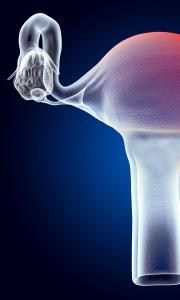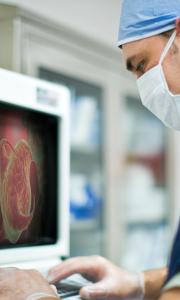
Because fibroids are common in women of reproductive age, many are concerned if conceiving with fibroids is a concern. Our fibroid doctors can tell you that women with fibroids can get pregnant and deliver healthy babies.
However, some women may experience issues with fibroids affecting their pregnancy. When fibroids are present during pregnancy, the main concern you may have is whether or not it will lead to infertility, premature birth or miscarriage. This concern is based on the fibroid’s size and location of it. Occasionally, fibroids can become large, and their blood supply becomes insufficient, causing severe pain. The pain may cause concern while pregnant.
Additionally, fibroids can cause the baby to be in a different position in the uterus. Because many women have fibroids, getting pregnant with them should not be a concern. Women between the ages of 35 and 45 may have a greater chance of getting fibroids. About 80% of women will have them by the age of 50. Unfortunately, they aren’t always easy to detect during pregnancy. Because of the thickening of uterine muscles during pregnancy, doctors have trouble distinguishing uterine fibroids. Women with fibroids usually have normal pregnancies, but some women have difficulties.
The most common fibroid symptoms in pregnant women include:
- Fever
- Pain
- Nausea
- Anemia which causes fatigue
- Increased level of white blood cells
- Bleeding
“As fibroids grow, they can push on vital structures that are important for fertility.” – Dr. Jacob White, USA Fibroid Centers
Due to the risk to the fetus during pregnancy, fibroid treatment is not an option. Because of this, expectant mothers should rest, drink fluids, and take mild pain relievers to manage the symptoms of fibroids. Once the baby is born, USA Fibroid Centers offers a safe and effective fibroid removal procedure called uterine fibroid embolization. We are known for our expertise in non-surgical treatments for uterine fibroids by our fibroid specialists. You can schedule an appointment with one of our fibroid specialists by clicking here.
 Can Fibroids Affect Pregnancy?
Can Fibroids Affect Pregnancy?
Fibroids vary and can be as small as a pea or as large as a grapefruit. They can grow inside the uterine cavity, outside the uterine wall, or inside the uterine wall. Furthermore, multiple fibroids of varying sizes are common among women.
In most cases, fibroids do not grow during pregnancy, but if they do, they usually do so in the first three months. Because fibroids require estrogen to grow, they must get estrogen to survive. When you’re pregnant, your body produces more of it.
The main issues with having fibroids while pregnant:
- Bleeding and pain.
- Miscarriage.
During your second and third trimesters, as your uterus expands to make room for your baby, fibroids can push against the baby.
You may experience pain during your pregnancy due to this. Fibroids can sometimes twist, causing cramps and discomfort. There are also times when the fibroid outgrows its blood supply, turns red, and dies. Miscarriage is possible in some cases.
Do Fibroids Affect Pregnancy?
During pregnancy, the biggest concern is whether the fibroid will increase the risk of preterm labor or miscarriage. Fibroids grow so large that the blood supply is inadequate, causing severe pain. Additionally, fibroids may change the baby’s position inside the uterus.
It is possible to undergo uterine fibroid embolization (UFE) after pregnancy?
Many women feel limited by the treatment options available for uterine fibroids, which can be invasive and have a lasting effect on their fertility. Non-surgical fibroid treatment is our priority, so women can get pregnant and live the lives they envision. You can start or grow your family without letting fibroids dictate your choices. Our fibroid specialists at USA Fibroid Centers offer minimally invasive uterine fibroid embolization that shrinks fibroids without surgery.
How Do Fibroids Affect Pregnancy?
Fibroids can affect pregnancy and fertility depending on their size and location. Fibroids can cause the uterus and cervix can change.
Symptoms and treatment of fibroids may vary depending on how many you have, where they are located in the uterus, and how big they are.
Fibroids and Infertility
Fibroids, in most cases, don’t result in infertility, but they can impact fertility in several ways, including:
- affect the shape of the uterus, which prevents some sperm from entering.
- shape the uterus in a way that affects the fetus.
- block sperm or eggs from entering the fallopian tubes.
- blood flow to the uterus or baby is impeded due to disruption of the uterine lining.
- affect the baby’s position in the uterus, resulting in premature birth or miscarriage.
You should discuss your options and birth plan with your doctor if you have fibroids or recently had fibroids.
In many cases, during delivery, fibroids may cause women to have a c-section.
SCHEDULE ONLINE AT A LOCATION NEAR YOU
Fibroids Can Affect Pregnancy
When women are pregnant, fibroids do not always cause problems. However, some women with fibroids experience complications during pregnancy. When pregnant, fibroids are most commonly associated with pain. If you have fibroids, you may be more likely to experience other difficulties during pregnancy and delivery.
These pregnancy complications include:
- Preterm delivery. Fibroid pain can result in uterine contractions, leading to an early delivery.
- Growth restriction. Fibroids can interfere with a fetus’ growth because there isn’t enough room in the uterus.
- Placental abruption. When a fibroid blocks the placenta from attaching to the uterine wall, it breaks away.
- Breech position. Vaginal delivery may be impossible with the abnormal shape of the cavity.
- Cesarean delivery. A woman with fibroids is more likely to require a c-section delivery than one without.
- Miscarriage. For women with fibroids, the chances of miscarriage double.
 Can Fibroids Cause Pain On Your Side?
Can Fibroids Cause Pain On Your Side?
Uterine fibroids can grow quite large and cause discomfort and pressure. Back or pelvic pain is usually associated with fibroids. In addition to stomach discomfort, intense cramps during menstruation, or pain during intercourse, some people also experience painful periods. In addition, you might feel an increased urge to go or go more often, have painful urination, and experience pain on one side.
Fibroid Symptoms:
- Bleeding in between periods.
- A prolonged or heavy period.
- Back pain in the lower back.
- Discomfort or fullness in the abdomen.
- Pain in the pelvis.
- Urination and bladder emptying symptoms, including frequent urination.
- Constipation or straining during bowel movements.
SCHEDULE ONLINE AT A LOCATION NEAR YOU
Why do Fibroids Cause Bleeding?
Fibroids can cause more bleeding than usual because they press against the uterine lining. The uterus may not contract properly, resulting in bleeding that cannot be stopped. Due to fibroids, blood vessels may grow, resulting in heavier or irregular periods and spotting between periods.
For women who want children, uterine fibroid embolization may be an option. It is a minimally invasive and non-surgical treatment option. UFE cuts off their blood supply to shrink and manage fibroids rather than removing them surgically. It is possible to prevent fibroids from receiving vital nutrients by injecting tiny embolic particles into their arteries. Because the uterus remains intact after uterine fibroid embolization, many women can still have children and deliver naturally.
What Are Ways That Fibroids Affect My Pregnancy?
During pregnancy, fibroid tumors could cause miscarriage, reduce amniotic fluid, and cause heart problems for your baby. Furthermore, pregnant women with fibroids have a much higher chance of placental abruption.
Fibroids can interfere with a baby’s development or cause difficulties during delivery if they are present during pregnancy. In addition to abdominal pain during pregnancy, fibroids can lead to premature labor in women with fibroids.
Contact USA Fibroid Centers for Fibroid Treatment
As a minimally invasive procedure, uterine fibroid embolization (UFE) treats fibroid tumors. Fibroids may affect pregnancy or trying to get pregnant. UFE can eliminate fibroid-related symptoms in pregnant women who get the procedure after pregnancy.
During your period or at any time, if you experience any changes or discomfort, contact USA Fibroid Centers. You can get rid of fibroids if you have them. Uterine Fibroid Embolization (UFE) is a non-surgical option. Compared to hysterectomy and myomectomy, uterine fibroid embolization has minimal pain.
If you suspect fibroids, USA Fibroid Centers can be reached at 855.615.2555 or fill out our online scheduling form. You can schedule a virtual doctor visit if you prefer telemedicine. We look forward to connecting with you to see if you are a candidate for UFE.

 Can Fibroids Affect Pregnancy?
Can Fibroids Affect Pregnancy? Can Fibroids Cause Pain On Your Side?
Can Fibroids Cause Pain On Your Side?

